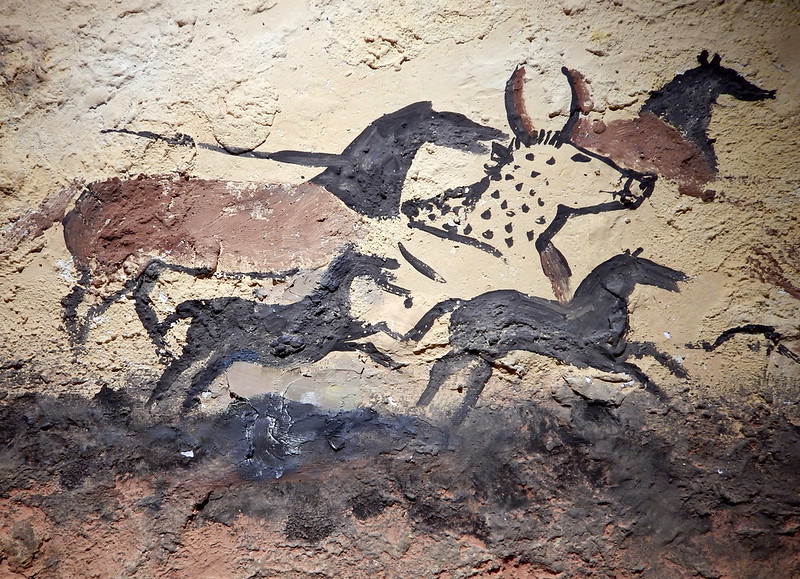We sandbag the ventricle leak of ancient light
to restore haloes to the right objects –freezers, turn signals,
microwaves.
Everything is early, spry with milt, the delicate climate
of arrival, draughts of air so narrow our ears fold back
their sounds. Comb-over psalms smelt muzzles
from the overlap of horse heads. Music can’t
caress itself by these long-playing lassoes.
Contour before line, overtones before the molten bell
of an opening. We are sphinx-cubs in our hiding places.
The sky on our skin still unhewn,
our scribbled brochures of lightning.
Without provisions, a more vulnerable hibernation,
a species liable to generic dreams.Then thrash
and release, the fan of land-locked arms. Quick
lime sparks each loaded
cloud or brush.
Anyone can draw a blue bead
on the G.P.S. –forking river for the vector home,
or carve a new nipple
for the salt lick continent.
Image: left wall of the hall of bulls by Mike Beauregard, licensed under CC 2.0.
Judson Evans:
“Codex” is part of a collaborative project with Gale Batchelder & Susan Berger Jones—a book of poems, Chalk Song, in response to Werner Herzog’s documentary Cave of Forgotten Dreams about (what was when he filmed) the oldest know cave paintings. Georges Bataille wrote “animals are in the world as water in water.” I was drawn to connections between the bodily substance of the beehive and the technology of the book as a way to explore the border where animal sensorium bleeds over into distinctly human consciousness. “Codex” conflates the breakthrough of language to the breakdown of the fusion of human and nature; the numbed waking into consciousness at the start of human history with the slow acknowledgement of human responsibility in the destruction of the Anthropocene. As children, we have all perhaps had the experience of camping out in a tent in a rainstorm. All is safe and dry until someone puts their hand to the undersurface of the tent’s canvas when suddenly the water flows through, cold and startling. This is the central sensory inspiration for the poem.
Judson Evans was chosen as an "Emerging Poet" by John Yau for The Academy of American Poets in 2007 and won the Philip Booth Poetry Prize from Salt Hill Review in 2013. His poems have appeared in Folio, Volt, Cutbank, and The Sugar House Review. Chalk Song, his collaborative book of poems inspired by paleolithic cave paintings (with poets Susan Berger-Jones & Gale Batchelder), will be published by Lily Poetry Press, Boston, in the fall of 2021.
Latest posts by Judson Evans
(see all)


